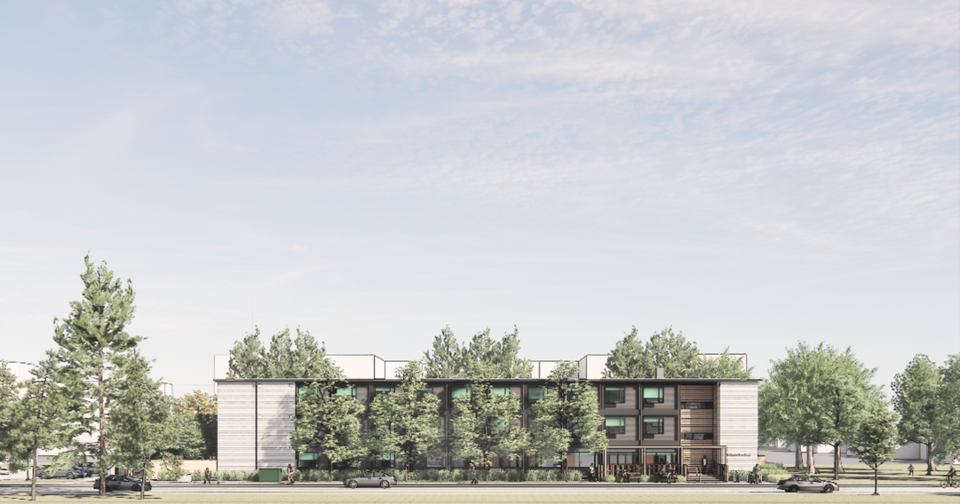This article was first published by TorontoToday, a Village Media publication.
After years of delays, legal battles and political resistance, a 59-bed supportive housing project in North York is finally moving forward — though it will cost the city more than $21 million above the original budget.
On Thursday, Mayor Olivia Chow marked a turning point, welcoming deliveries of the prefabricated housing modules and announcing that non-profit WoodGreen would operate the building.
“Everyone deserves a safe and affordable place to call home. We need to build more homes faster, leveraging new techniques including prefabricated construction,” Chow said in a press release. “This project will create affordable housing to help seniors transition from homelessness.”
Located at 185 Cummer Ave. — formerly 175 Cummer Ave. before being renumbered during the rezoning process — the three-storey building is part of the city’s modular housing initiative.
Toronto launched its modular housing program early in the pandemic, with the goal of constructing over 200 supportive units for vulnerable residents, including those experiencing homelessness. Built off-site and then assembled on city-owned land, modular housing is faster and significantly less expensive than traditional builds.
Despite being one of five modular housing sites announced in 2021, the Cummer Avenue project has faced some of the fiercest pushback.
Opposition from residents and local officials stalled construction, turning the site into a flashpoint in Toronto’s broader struggle to build affordable housing — especially when future tenants are seen by some as a threat to neighbourhood character.
The project is now expected to be completed in early 2026.
Local city councillor Lily Cheng (Willowdale) — who had previously opposed the development — said her concerns have now been addressed. She said she had worried about the building’s impact on residents at the adjacent seniors' public housing complex.
“There is no 24-hour security here, and given some of the news from other implementations of shelters and supportive housing, [the neighbouring seniors] were unsure of whether or not their interests would be cared for,” she said.
Cheng noted the inclusion of older adults among future residents was key to building local support.
“That is something the community really wanted, but it was difficult for the city to provide that assurance earlier in the process,” she added.
“I think we’ve landed on the best possible outcome,” she said.
Four of the five sites in the modular housing initiative — including one at 321 Dovercourt Rd. in Little Portugal — have moved ahead without major disruption.
But Cummer Avenue’s progress was halted in 2021, when the city asked the provincial government to issue a Minister’s Zoning Order (MZO) to fast-track approval.
MZOs are a special tool that allows the province to bypass traditional planning processes and speed up development. While the other sites got a green light from the Ford government, the Cummer MZO was denied.
According to Toronto Star 's reporting, the rejection came after opposition from former housing minister Steve Clark and Willowdale MPP Stan Cho, who represents the area.
Cho did not respond to a request for comment on Thursday.
The building has also been inundated by legal troubles.
The Cummer site was the subject of a court challenge launched in 2022 by a community group and a local developer. It took two years for the matter to be resolved. In March 2025, the Ontario Divisional Court sided with the city, ending the battle once and for all.
By then, costs had ballooned.
Originally budgeted at $14 million, the project’s price tag now stands at $36 million. Nearly $5 million was spent on storing and transporting the prefabricated modules during the legal delay.
Some units were damaged in storage, requiring $1 million in repairs. Rising construction costs and modifications to the project added another $16 million.
According to Abi Bond, head of Toronto’s Housing Secretariat, no further cost increases are expected.


.png;w=120;h=80;mode=crop)

